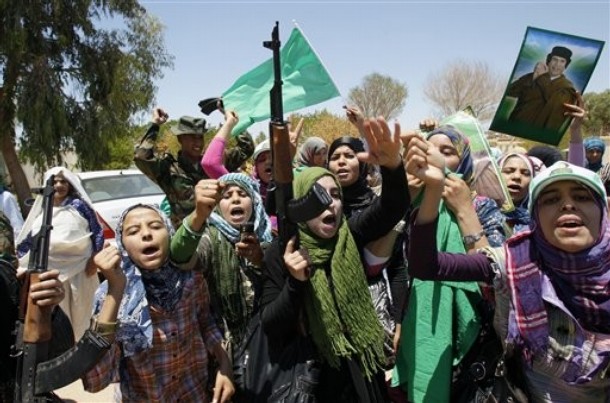
From Paul Richert, the Los Angeles Times: With victory still elusive after 15 weeks of bombing, Western allies arrayed against Libyan leader Moammar Kadafi are racing to crack his regime before their own coalition fractures.
Even as Libyan rebel fighters begin to show improvement and the North Atlantic Treaty Organization increases airstrikes in the western part of the country, signs of friction have appeared within NATO. Members have expressed concern about declining munitions inventories and warned that the costs and stresses of the campaign cannot be sustained.
The eight nations shouldering the military burden have been pushing in vain for the other 20 NATO members to take on a larger role. Behind the scenes, meanwhile, major players disagree among themselves on the best strategy. The urgent desire for a breakthrough has caused some members to take riskier steps in the hopes of defeating Kadafi quickly, including airdrops of weapons to rebels, which the French military recently announced it had carried out.
Several signs of discontent have become public. In the Netherlands, Defense Minister Hans Hillen complained last week of "mission creep" and suggested that the campaign’s advocates were deluded in believing they could crush Kadafi.
"People who thought that merely by throwing some bombs it would not only help the people, but also convince Kadafi that he could step down or alter his policy were a little bit naive," Hillen told reporters in Brussels.
Italian Foreign Minister Franco Frattini scolded the coalition over the accidental killing of civilians and called for a cease-fire — a step that U.S., British and French officials say would allow Kadafi to regroup.
In Washington, the Obama administration faces pressure from Republicans as well as antiwar Democrats. A GOP-sponsored measure to curb U.S. participation failed in a vote on the House floor, partly because some Republicans felt it wasn’t restrictive enough. . . .
Officials and outside observers also acknowledge that pressure is growing for the coalition to deliver a knockout blow. If not, the Western powers, under acute economic stress and struggling with other military obligations, might have to negotiate an exit on terms that could leave Kadafi some leverage.
"All the countries are watching an economic and political time clock," said Jorge Benitez, a veteran NATO watcher at the Atlantic Council of the United States. "The question is: Whose coalition will break first, Kadafi’s or NATO? . . ."
U.S. and European officials say they believe Kadafi’s camp may be on its last legs, but few insiders predict a quick end. Luis Ocampo Moreno, the International Criminal Court prosecutor who announced an arrest warrant for Kadafi, predicted last month that collapse was close — in "two or three months." (photo: AP)
Image: ap%207%205%2011%20pro%20Gaddafi%20women.jpg
